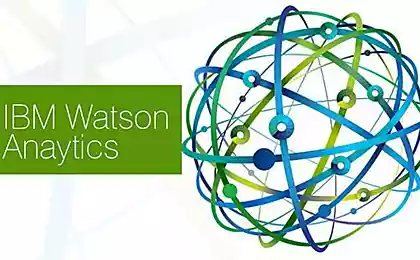1087
The new service from IBM Watson will help scientists to work more efficiently
IBM has introduced a new addition to the cognitive capabilities of IBM Watson, which allows researchers to accelerate scientific research by finding previously unknown relationships in the analysis of big data.
The new service IBM Watson Discovery Advisor available in the cloud and designed to helping scientists to work on research projects. This service allows you to reduce the time needed to confirm the hypotheses and formulate conclusions from months to days and days to hours, opening up new opportunities for research and development.
Based on the ability of IBM Watson understand natural language, Watson Discovery Advisor same way understands the language of science, for example, the how to interact with the chemical elements, and provides a full-featured tool for professionals conducting research in the field of life sciences and other areas.
Scientists from leading academic, pharmaceutical and other commercial research centers are already using the new service so that in a short time to analyze and confirm the hypothesis by using data from open sources. The new study is published daily every 30 seconds. In turn, a year is published about one million scientific papers (Source: CiteSeer *). According to the National Institutes of Health, the average researcher reads about 23 scientific papers per month, or about 300 a year. This means that fully cope with the growing number of scientific publications is physically impossible.
In 2013, in 1000 the leading research and development companies have spent more than $ 600 billion on research (source: Strategy &). If we take as an example of a full cycle of development of a pharmaceutical preparation, the study moving rather slowly, taking an average of 10 to 15 years (source: Pharmaceutical Research and Manufacturers of America). Using Watson Discovery Advisor, scientists can discover new or previously undisclosed communications among disparate data that could potentially greatly accelerate the pace of scientific research.
"We stand on the threshold of a new era of scientific discovery, based on big data - says Mike Rodin (Mike Rhodin), senior vice president, IBM Watson Group. - Watson Discovery Advisor is a logical addition to the existing cognitive capabilities of a supercomputer Watson. We offer the industry a powerful tool that will help increase the impact of investments in research and development, eventually leading to new important discoveries ».
Leading research organizations, including the Baylor College of Medicine, Group of Johnson & Johnson and the Center for Genome Research in New York, are already starting to use Watson Discovery Advisor to accelerate the development of research projects.
• According to a joint study Baylor College of Medicine and IBM , the scientists demonstrated a new opportunity for asking questions that may be useful in the context of the long-term development of new and effective ways to treat diseases. Within a few weeks, biologists and specialists in data processing using a set of tools Baylor Knowledge Integration Toolkit (KnIT), based on the technology of Watson, to accurately determine the proteins that modify p53 - an important protein that directly affect the progression of cancer. The finding could help to accelerate the development and enhance the effectiveness of drugs and medicines. Otherwise, this study could take several years. Technology Watson helped analyze 70000 scientific papers to determine the proteins that affect the activity of p53. Automated data analysis allowed the researchers to identify six proteins for the next study. This marks a significant breakthrough, because in the past 30 years, scientists can deal with the study of only one protein per year.
"On average, a scientist can read from one to five studies in the day - says Dr. Olivier Lichtardzh (Olivier Lichtarge), the lead researcher and a professor of molecular genetics at Baylor College of Medicine. - If we talk specifically about p53, a protein that is dedicated to more than 70,000 scientific papers. Even if I'm going to read five studies in the day, I spend almost 38 years in order to fully digest all the information available today. Technology Watson, in turn, has demonstrated the possibility of increasing the speed and quality of research ».
• The company Johnson & Johnson is working with the development team IBM Watson Discovery Advisor to the supercomputer Watson to teach to read and understand scientific papers that describe in detail the results of clinical trials of drugs. Cooperation between the two companies could affect the comparative analysis of the effectiveness of drugs, which will allow medical staff to assign the correct treatment for patients, as well as to minimize side effects. On average, the comparative analysis of efficiency, made by hand, requires the participation of three specialists and work for 10 months, only to collect the necessary data and prepare them to analyze and validate hypotheses. Experts Johnson & Johnson and IBM are hoping to teach a supercomputer efficiently extract information directly from the medical literature, allowing the researchers to ask questions based on the data obtained in order to determine the effectiveness of the treatment compared with the use of other drugs, as well as to minimize the side effects of their use.
• IBM Watson supercomputer will support the analysts' Center for Genome Research in New York in the development of genomic medicine. The attention of researchers will focus on the clinical application of genomics to help oncologists provide treatment based on the DNA of patients with glioblastoma - an aggressive form of brain cancer, from which killed more than 13,000 Americans each year. Despite significant advances in the study of the genetic causes of cancer, the huge size of arrays of genomic data make it difficult to use them to find effective treatments. Based on the results of a new clinical trial in the near future IBM Watson will help to accelerate the provision of personalized treatments.
Practical application
New technologies can be applied in all areas that require analysis of large amounts of information. Cognitive computing allow experts to work with huge amounts of data, including the products of intellectual labor of many experts.
Watson can be used:
- To help developers of medicines needed to save the lives of many people
- Expansion of financial analytical capabilities konsultantov- Improvement Strategy lawyers in mergers and acquisitions at the expense of a more comprehensive assessment and analysis of legal documents
- For public analysts in the areas of security
- To create new recipes. Cooks can use Watson for the creation of new courses, the study of the principles of preparation and composition of food, as well as the use of a huge database of recipes with information about the compatibility of products, chemistry and kitchens around the world.
IBM Watson Discovery Advisor can transform the industry and trade, based on data, such as law, biotechnology, education, chemistry, metal production, scientific research, technology and forensics.
Source: habrahabr.ru/company/ibm/blog/236295/



















